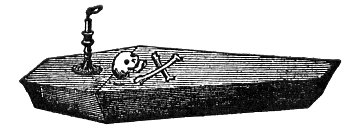Q. Have you that obligation?
A. I have.
Q. Will you give it?
A. I will with your assistance.
Q. Proceed. (I, A. B., etc., etc. See obligation.)
Q. Have you a sign belonging to this degree?
A. I have several.
Q. Show me a sign. (Give sign.)
Q. What is that called?
A. A duegard.
Q. Show me another sign. (Gives sign.)
Q. What is that called?
A. The sign.
Q. To what does it allude?
p. 216
A. To the penalty of my obligation, that I would have my breast torn open–my heart torn out and exposed to rot upon the dung hill, sooner than divulge any of the secrets of this degree unlawfully.
Q. Show me another sign. (Give sign of admiration.)
Q. What is that called?
A. The sign of admiration.
Q. To what does it allude?
A. To the wonder and admiration of our ancient brethren who were present and permitted to view the interior of that magnificent edifice which King Solomon had erected, and was about to dedicate to the service of the Supreme Being.
Q. Have you a grip?
A. I have.
Q. Communicate it to a brother? (Give grip.)
Q. Has it a name?
A. It has.
Q. Give it. (Rabboni.)
Q. What does it signify?
A. Good Master or Most Excellent Master.
Q. What is it otherwise called?
A. The cover grip.
Q. Why?
A. Because as this covers grips of preceding degrees, so should we as Most Excellent Masters, considering that man in his best estate is subject to frailties and errors, endeavor to cover his faults and imperfections with the broad mantle of charity and brotherly love.
Q. When originated this grip?
A. At the completion of the temple. When King Solomon entered he was so well pleased with the master builder that he took him by the right hand and exclaimed, Hail, Rabboni, which signifies Good Master and Most Excellent Master.
Q. What followed?
A. A procession was formed, the ark safely seated, the cap stone placed in the principal arch, and Lodge closed with solemn invocations to Deity.
Footnotes
200:1 The Masonic tradition upon which the Degree is founded is described in the ancient Book of Constitutions, in the following words.
“The Temple was finished in the short space of seven years and six months, to the amazement of all the world; when the cope-stone was celebrated by the fraternity with great joy. But their joy was soon interrupted by the sudden death of their dear Master, Hiram Abiff, whom they decently interred in the Lodge near the Temple, according to ancient usage.
After Hiram Abiff was mourned for, the tabernacle of Moses and its holy relics being lodged in the Temple, Solomon, in a general assembly, dedicated or consecrated it by solemn prayer and costly sacrifices past number, with the finest music, vocal and instrumental, praising Jehovah upon fixing the holy ark in its proper place, between the cherubim; when Jehovah filled his own Temple with a cloud of glory.”
200:2 It is an established doctrine of the Order, that while three form a Lodge, and five may hold it, seven only can make it perfect. In such a case there requires an intermediate Degree to complete the series; for the Mark and Past Masters have been already admitted into the Craft Lodges. This Degree, as used by our transatlantic brethren, who are zealous and intelligent Masons, is called the Excellent Master, and the routine is thus stated: 1, E. A. P.; 2. F. C.; 3. M. M.; 4. Mark Master; 5. Past p. 201 Master; 6. Excellent Master; 7. Royal Arch.–Historical Landmarks. vol. ii, p. 669.
204:1 “She turned herself, and saith unto him, RABBONI; which is to say Master.”–St. John xx. 16.
208:1 We have seen in the Masonic ceremonies a constant reiteration of the number three, and sometimes thrice repeated, which is called giving the grand honors of Masonry. There must have been some cause or reason for this custom. now unknown. And I will venture to say, that its original intention was in honor and out of reverence to the ancient Trinity. The practice seems to be kept up by the Church of Rome, which goes to corroborate this opinion. One of the rules established by the reverend mother abbess of the Ursuline Convent at Charlestown, as reported by Miss Reed, one of the novices in that institution, is, “before entering the room, to give three knocks on the door, accompanied with some religious ejaculation, and wait until they are answered by three from within.” The Mason will see that this is an exact copy of his rules and practice.

Moe is the founder of GnosticWarrior.com. He is a father, husband, author, martial arts black belt, and an expert in Gnosticism, the occult, and esotericism.


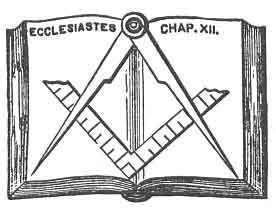
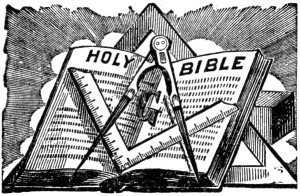
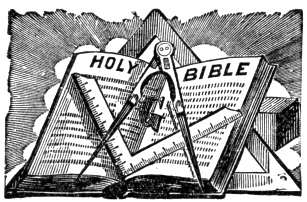
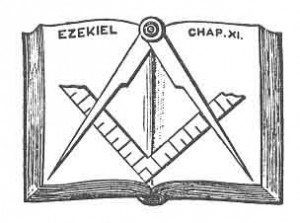

![How the Abbot Ceolfrid sent master-builders to the King of the Picts to build a church, and with them an epistle concerning the catholic Easter and the Tonsure [710 A.D.] | Book 5 | Chapter 20 How the Abbot Ceolfrid sent master-builders to the King of the Picts to build a church, and with them an epistle concerning the catholic Easter and the Tonsure [710 A.D.] | Book 5 | Chapter 20](https://www.gnosticwarrior.com/wp-content/plugins/contextual-related-posts/default.png)
